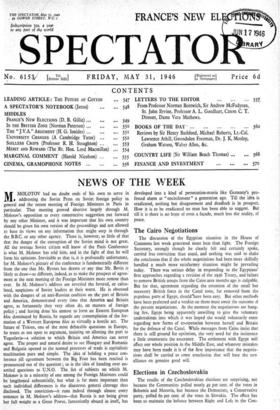NEWS OF THE WEEK
MMOLOTOV had no doubt ends of his own to serve in • addressing the Soviet Press on Soviet foreign policy in general and the recent meeting of Foreign Ministers in Paris in particular. That meeting proved abortive largely through M. Molotov's opposition to every constructive suggestion put forward by any other Minister, and it was important that his own country should be given his own version of the proceedings and not allowed to base its views on any information that might seep in through the B.B.C. or any other agency. There is, however, so little of that that the danger of the corruption of the Soviet mind is not great. All the average Soviet citizen will know of the Paris Conference is what M. Molotov has told him, and in the light of that he will form his opinions. Inevitable as that is, it is profoundly unfortunate, for M. Molotov's picture of the conference is fundamentally different from the one that Mr. Byrnes has drawn or any that Mr. Bevin is likely to draw—so different, indeed, as to make the prospect of agree- ment at the next meeting of the Foreign Ministers more remote than ever. In M. Molotov's address are revealed the fevered, or calcu- lated, suspicions of Soviet leaders at their worst. He is obsessed with the dangers of an anti-Russian coalition on the part of Britain and America, demonstrated every time that America and Britain agree, as fortunately they very often do, on matters of foreign policy ; and having done his utmost to form an Eastern European bloc dominated by Russia, he regards any contemplation of the for- mation of a Western European bloc as virtually a hostile act. The future of Trieste, one of the most debatable questions in Europe, he treats as not open to argument, insisting on allotting the port to Yugoslavia—a solution to which Britain and America can never agree. The proper and natural desire to see Hungary and Rumania and Bulgaria opened to the normal processes of trade is capitalistic machination pure and simple. The idea of holding a peace con- terence till agreement between the Big Four has been reached is pronounced out of the question ; so is the idea of handing over un- settled questions to U.N.O. The , fist of subjects on which M. Molotov is in a minority of one among the Foreign Ministers could be lengthened substantially, but what is far more important than such individual differences is the disastrous general cleavage thus disclosed. The conviction—it runs indeed through almost every sentence in M. Molotov's address—that Russia is not being given her full weight as a Great Power, fantastically absurd in itself, has developed into a kind of persecution-mania like Germany's pro- fessed alarm at " encirclement " a generation ago. Till the idea is eradicated, nothing but disagreement and deadlock is in prospect. How it is to be eradicated no man has been able to suggest. But till it is there is no hope of even a facade, much less the reality, of peace.






























